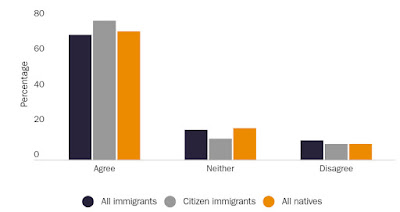Buscar este blog
Mostrando entradas con la etiqueta Confidence in American Institutions. Mostrar todas las entradas
Mostrando entradas con la etiqueta Confidence in American Institutions. Mostrar todas las entradas
viernes, 15 de febrero de 2019
By Alex Nowrasteh and Andrew Forrester
Note: Years covered by this survey question: 2014.
Note: Years covered by this survey question: 2014.
Figure 3 asks respondents to agree or disagree with this statement: “I am often less proud of America than I would like to be.” In contrast to figures 1 and 2, those who agree with the statement here are less patriotic and those who disagree are more patriotic. Thirty-two percent of all immigrants and 33 percent of citizen immigrants agree with the statement compared to 37 percent of native-born Americans. Forty percent of all immigrants disagree with the statement that they are “often less proud of America,” slightly below the 42 percent of native-born Americans. Fifty-three percent of immigrants who are American citizens disagree. The responses of all immigrants and natives are not different to a statistically significant extent. Table 3 shows that the second generation are the least likely to be “less proud of America.” As a twist, they are also the most likely to answer “neither” and the least likely to disagree.
Figure 4 shows responses to the question, “How proud are you of America in each of the following? Its fair and equal treatment of all groups in society.” All immigrants are proudest of fair and equal treatment, with 23 percent of them saying they are very proud and 48 percent saying they are somewhat proud. Twenty-two percent of citizen immigrants say they are very proud and 42 percent say they are proud. Native-born Americans are the least proud of how America treats groups equally. Immigrant pride in how America treats groups equally is higher than that of native-born Americans.
Figure 6 includes responses to the question, “How much do you agree or disagree with the following statement? The world would be a better place if people from other countries were more like the Americans.” This is just a general question that is correlated with how much the respondent likes Americans relative to foreigners. Thirty-nine percent of all immigrants and 40 percent of immigrant citizens agree that the world would be better if people from other countries were more like Americans. All immigrants are as likely as natives to disagree with the statement, while citizen immigrants are slightly more likely to disagree. However, there are no statistically significant differences between the responses of native-born Americans and all immigrants to this question. Table 6 shows that the second generation is more likely to say that “the world would be better if people from other countries were more like Americans” than any other generation of native-born Americans, as well as less likely to say the opposite.
There are at least three possible explanations for why immigrants are as patriotic or more patriotic than native-born Americans and why their love for this country is passed to the second generation. The first is that immigrants are more patriotic because they chose to become Americans. All things being equal, we should expect those who choose to become Americans to like America more than do those of us who were born here. Their children also understand that choice, which potentially explains their patriotic opinions. The second is that immigrants and their children have memories of how bad other countries are, so they are more appreciative of the United States and thus more patriotic. The third explanation, related to the second, is that disillusionment with the United States takes generations to set in, so only those whose ancestors settled here several generations ago are knowledgeable enough to be less patriotic. Regardless of the possible explanations, immigrants and their children are at least as patriotic as native-born Americans and frequently more so.
To a statistically significant extent, all immigrants are more likely to have a great deal of confidence in Congress, the presidency, and the Supreme Court than are native-born Americans (Table A3). Immigrants are also more likely to have only some confidence in Congress and the presidency, to a statistically significant extent, relative to natives. However, immigrants are less likely, to a statistically significant extent, to have confidence in the Supreme Court relative to natives-although the difference is the smallest of any coefficient reported. Immigrants are also less likely to have hardly any confidence in all three branches of government, relative to natives, to a statistically significant extent.
There are at least two possible explanations for the greater immigrant trust in the three branches of the federal government. The optimistic explanation is that immigrants appreciate how well the US government functions because they remember that their home governments were quite bad.10 The cynical explanation is that immigrants and their children have not had enough experience to realize how poorly these American branches of government function and hence it takes several generations of distance from the governments that their ancestors lived under to lose that perspective.
Suscribirse a:
Comentarios (Atom)



















